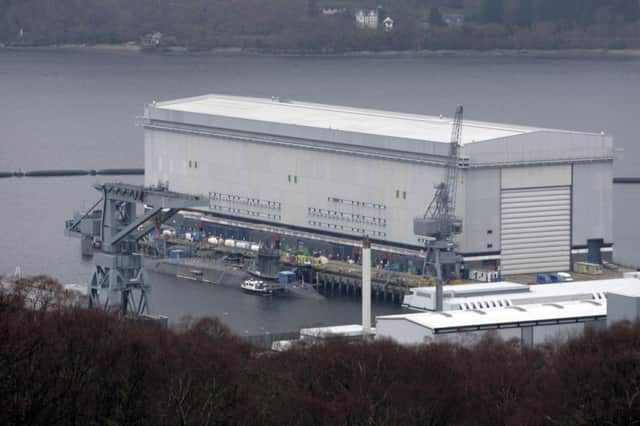New defence contract secures 1,500 Faslane jobs


Defence Secretary Michael Fallon said the “huge” deal would give long-term security to workers at the Faslane base, as site manager Babcock was awarded the £2.6bn repair and maintenance contract to support the Royal Navy fleet.
However, the SNP leadership accused the Conservative-led government at Westminster of using the referendum result as an excuse to maintain the Clyde, where Trident missiles are based, as a “nuclear dumping ground”.
Advertisement
Hide AdAdvertisement
Hide AdBabcock also manages Devonport in Plymouth, where thousands of jobs have seen secured, while BAE Systems, which manages HMNB Portsmouth, has been awarded a £600 million contract.
With the SNP campaigning to remove Trident submarines from Scotland in the event of a vote for independence, No campaigners had warned voting Yes would put thousands of jobs at Faslane and in the surrounding area under threat.
Speaking on the referendum result, Mr Fallon said: “A majority voted to stay in the United Kingdom and all parts of the United Kingdom benefit from the nuclear deterrent.
“Those submarines keep us all safe – Scotland, England, Wales and Northern Ireland.” A £348m MoD contract for BAE Systems to build three new Royal Navy warships on the Clyde was formally signed just over a month before the vote on 18 September.
And the latest £3.2bn MoD deal also secures up to 4,000 posts at HMNB Devonport and more than 2,000 at Portsmouth.
Mr Fallon stressed that in “an increasingly dangerous world” it would be “folly” for the UK to unilaterally disarm, as he announced the five-and-a-half-year contract.
He said: “This is the second biggest defence contract placed by this government and reflects our commitment to giving our armed forces what they need to keep Britain safe.’’
Mr Fallon added: “There are no new jobs but I think it’s very important to reassure those who are working on the Clyde, now that the referendum is over, that they will have that job security.’’
Advertisement
Hide AdAdvertisement
Hide AdScottish Secretary Alistair Carmichael also welcomed the deal, saying: “This is a huge investment in Scotland’s largest single site employer.
“It will support hundreds of skilled workers and their families as well as providing a substantial boost to the local economy along the Clyde.’’
However, SNP defence spokesman Angus Robertson, also the Nationalist leader at Westminster, hit back as he attacked the main Unionist parties backing for Trident.
He said: “It hasn’t taken long for the Tories to pledge to spend billions more to keep their weapons of mass destruction in Scotland following the referendum.
“The SNP wants a secure long-term future for Faslane – investing in it as a conventional naval base. Instead of hosting these obscene nuclear weapons designed for the Cold War, Faslane should be a 21st-century facility for its naval defence needs now and in the future, not a nuclear dumping ground.”
Babcock welcomed the news and union GMB said it was ‘‘a massive compliment to the skills and expertise’’ of the Clyde workforce.
ANALYSIS
Tim Ripley: The real test of UK government commitments is the Type 26 frigate deal
Its party conference time and there is an election in seven months’ time. So, surprise, surprise, defence secretary Michael Fallon yesterday announced £3.2 billion worth of contracts to run the Royal Navy’s main dockyards. Some 7,500 jobs have been saved, the minister said.
Advertisement
Hide AdAdvertisement
Hide AdIn America, they call such blatant use of government money to win votes pork barrel politics, and it’s a grubby business as senators and congressmen lobby to get the Washington government to spend tax dollars in their states and districts.
Mr Fallon has instead to wrestle with the problem that, our defence budget having shrunk so much, “good news” contracts are very few and far between these days so they need to be milked to maximum effect. Hence two rather dull contracts have been held back to be deployed to maximum effect: to coincide with the defence secretary’s speech to the Conservative Party Conference.
Industry watchers are not at all surprised by these contracts. Babcock has been running Faslane naval base for more than a decade and its counterpart at Portsmouth, BAE Systems, is in a similar position. The Ministry of Defence needs someone to run its naval bases, so the announcement of the contract extensions for another five years was no real secret.
The Faslane contract would even have survived a Yes vote in last month’s independence referendum, as the SNP had promised to allow the Trident submarine base to remain open for another five years until a new facility could be opened in England or Wales to house the Royal Navy’s nuclear subs.
The contract shipbuilding workers on the Clyde are really waiting for is the Type 26 future frigate. This will be the real test of commitments given by the UK government that, should Scotland vote No, this £5 billion contract would go BAE System’s Govan shipyard. This deal will secure the jobs of thousands of BAE Systems workers and suppliers all over the UK. An announcement is expected before the end of the year.
Expect the announcement to be linked to a commitment by the Conservatives to peg defence spending to 2 per cent of gross domestic product – a totemic benchmark after David Cameron got September’s Nato summit to commit alliance countries to aim for this level of defence spending.
This is aimed at putting Labour on the spot and forcing them to say if they will spend as much on defence. By linking the Type 26 and defence spending rises, the Tories will be able to portray Labour as putting defence industry jobs at risk and undermining support in key marginal consitituancies, where work is to be carried out on the Type 26 project.
SEE ALSO